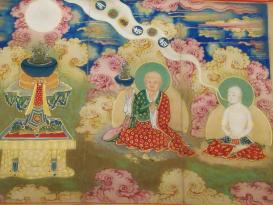My project focuses on chanting texts for monastic ordination examinations as a method to plan, prove, and evaluate Buddhist knowledge. During the Tang Dynasty, would-be monks and nuns took part in examinations by memorizing and chanting prescribed amounts of text in order to gain admittance to the clergy. These monastic examinations were modeled on the secular civil examinations. Chanting served as a useful tool for the verification and evaluation of learning because unlike elaborations on scriptural content, which may be subject to personal understandings, or meditation, which can only be appraised by the practitioners themselves, chanting performances could be evaluated quantitatively: they relied on fixed amounts of text that an examiner could follow along with to judge the accuracy. This project investigates learning strategies and techniques employed by medieval Buddhist communities, oral reading practices, examination frameworks, and methods of verification and judgment. Through this research I seek to change the scholarly perspective on Buddhist chanting: rather than just serving as a component of rituals or as a recondite practice believed to incite miracles, chanting also had a practical application through its educational role.

Illustration from the Ming dynasty version (1428) of the Zhenchan neiyin dunzheng xuning fajie jin'gang zhi jing 真禪內印頓證虛凝法界金剛智經 by Shen Du 沈度
Project
(2017-2018)
